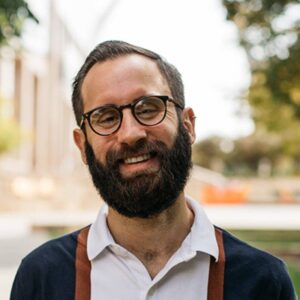We can—and should—have faith in each other, one human to another. You can have faith in someone and, sometimes, that’s all they need to hear to get through whatever life throws at them.
On the Thred platform, we acknowledge that various postures of faith can engage in spiritual dialogue together. From time to time, we’d like to offer a look at some of the differing perspectives you will find online. Today, we are excited to hear from an author who is atheist, joining us for a conversation about how he thinks about faith. Consider how his point of view could impact a conversation with you about faith.
Religion has a funny way of complicating things.
Take something as straightforward as faith. I don’t necessarily mean faith in the religious sense; I’m simply referring to the idea of trusting in someone.
Can someone be faithful and not religious? Is faith reserved for those who believe in and practice a specific religion? Can those of us who don’t identify with a religion still have faith in others? In the future? In healing from our pain?
These are the types of questions that lead me to scrolling online forever, until I forget why I unlocked my phone in the first place.
It starts with trust
I’d like to think faith and religion can exist separately. I’ve always considered myself to be an optimist and, if you ask me, faith and optimism sound eerily similar. According to Dictionary.com, faith is “complete trust or confidence in someone or something” and optimism is “hopefulness and confidence about the future or the successful outcome of something.”
After reading between the lines, it looks like both words are grounded firmly in trust. Having faith means you completely trust in someone or something, whereas having optimism means you trust that things will be okay in the future.
Trust means a lot to me. Every day, I tell myself that, no matter what, I have to trust everything will be okay. Weirdly enough, this feeling never really wavers, and this tends to be all the assurance I need.
When it comes down to it, my problem is sharing this optimism, or faith, with others.
Take this tragedy for example: several years ago, my mom called me in the middle of the night. As soon as I saw her name on my phone screen, my heart began to pound. While crying on the other line, my mom told me that her brother, my uncle, had just died. He was due for transplant surgery, but died in the ambulance on the way to the hospital. Ever since this call, I’ve been grappling with one simple question: how could I have reassured her that everything was going to be okay?
Most people would have told her, “He’s finally at peace,” or, “He was a good man who lived a great life,” or possibly some combination of both. But I froze and sat there in silence.
To be honest, I have no idea what happens to us after we die. As an optimist, I would like to think we actually do find peace and finally have a chance to see the people who died before us. But as someone who doesn’t necessarily believe in heaven, I can’t say for sure.
Next is presence
Do you see my problem here?
As much as I wanted to comfort my mom, I couldn’t, in good faith, tell her something I don’t necessarily believe in myself. It wouldn’t feel right to tell someone something just because you think it’s what they want, or need, to hear. I try to steer clear of doing this.
And how often do we battle in that middle ground between thought and speech when faced with big issues like this? A world crisis on the news, a friend’s online post about a loss, the bank account notification that always makes your heart squeeze.
We don’t want to just react. But at the same time, the silence can be deafening. How are we supposed to actually show grief?
Finally – relationship
After reflecting back on this entire situation, I can confidently say I have complete faith in my mom. I had confidence that she would make it through this loss and she would be stronger because of it. After all, she is the toughest, most independent person I’ve ever met—and she has witnessed her fair share of tragedy. I know that doesn’t make it any easier for her. But I really did believe she would get through this.
I realize now that faith doesn’t have to mean life or death. It shouldn’t only be reserved for gods and higher powers. We can—and should—have faith in each other, one human to another. You can have faith in someone and, sometimes, that’s all they need to hear to get through whatever life throws at them. So maybe faith isn’t that complicated after all. Maybe it only requires we show up, be open and honest with others and offer our presence—or a hand to hold. Maybe we need to unplug in the hard times and seek out the person behind the computer screen.
Because sometimes, all anyone needs is your present silence.
Interested in continuing the conversation with people like this author online? Make sure to check out the Thred curriculum series and our course on the Spiritual Conversation Curve, where you will receive practical tools for engaging in comity-driven spiritual conversations both in person and on your feed.
